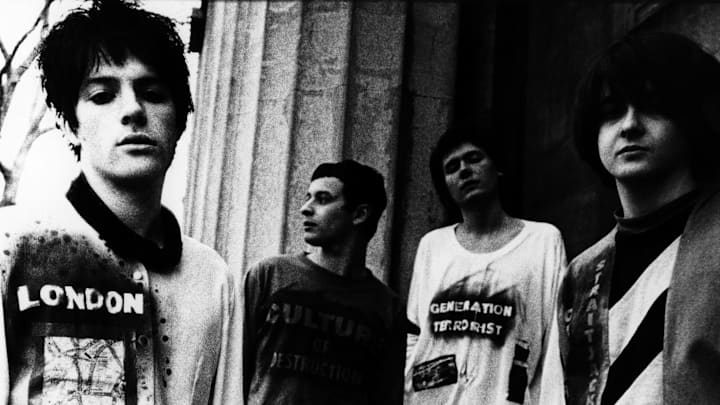I am honestly not sure which of the Manic Street Preachers members, James Dean Bradfield or Richey Edwards, was the most transformative during the making of the exceptional album, The Holy Bible. Edwards was the main lyricist of the group at the time and Bradfield was the lead guitarist and creating the music. But what happened on The Holy Bible is likely not ever to be done again by any band.
The band released their debut album, Generation Terrorists, in 1992. It was punk-infused but with a heavy dab of Joy Division and Television mixed in. The Manic Street Preachers didn't quite sound like anything else. But their second album, Gold Against the Soul, was a bit more radio-friendly and seemed intent on selling records instead of simply trying to make great songs.
For The Holy Bible, the band wanted to redo the direction they were headed. Bradfield said the record was made to be "100 percent truer to ourselves" instead of trying to go down a similar path of other, lesser-talented bands, of just churning out meaningless rock album after meaningless rock record. Gold Against the Soul was a mistake that needed to be remedied.
The Holy Bible by the Manic Street Preachers is among the best records ever made
But Richey Edwards had his demons. He dealt with mental health problems which partly led to an eating disorder. His lyrics were bleak essays on fascism, body image, and commercialism. But Edwards anger was directed as much toward himself as the outside world. His words were dense and not the simple four-line verse with two rhymes.
Bradfield had the job of taking Edward's thoughts and making them into some musical. But instead of going light with the darkness of the words, Bradfield made the music aggressive and incredibly melodic. He gives voice to Edward's words and sings in a way as if he was also the lyricist.
But this is not an easy album to listen to and it shouldn't be. Edward's battle with anorexia plays out in "4st 7lbs" and lyrics such as, "See my third rib appear, a week later all my flesh disappear/Stretching taut, cling film on bone, I'm getting better."
On "Archives of Pain," about capital punishment, Edward's writes, "Killers view themselves like they view the world, they pick at the holes/Not punish less, rise the pain, sterilize rapists/All I preach is extinction." And Bradfield sings with a cynicism right for the song, but the chorus bursts with release. The song, like many on the album, begins with a sample taken from a movie, TV show, or documentary. In the case of "Archives of Pain," the voice of a mother whose child was murdered by serial killer Pete Sutcliffe is heard. Fun stuff, indeed.
Every song on the album is brilliant. Most of the tracks are dense, so there may be several listens you need to do to completely accept breathe in the record. But the album is worth many listens and for several years. The track, "This is Yesterday," - the fourth song from the end - will give you some respite and brings light to an ever-darkening scope - but the final three tracks ("Die in the Summertime," "The Intense Humming of Evil," and "P.C.P." are all bangers that kick to the finish.
How Bradfield was able to create such wonderfully gothic music from the scattered bleakness, yet still excellent, of the lyrics is beyond the scope of most musicians. The album was fairly quickly made as well and recorded in the Manic Street Preachers' native Wales instead of the Bahamas where the record company reportedly wanted the album recorded. Maybe the small studio and fast recording helped the songs form to the fairly quick webs of chaos they are as well.
Edwards' health was always in question and a bit over five months after the album was released on August 29th, 1994, Edwards disappeared and has never been seen. The Manic Street Preachers have kept making albums, some excellent and some less so, but few bands can say they have recorded a record as good as The Holy Bible. The album continues to be among the greatest you could listen to now.
